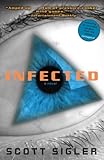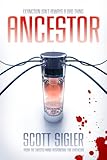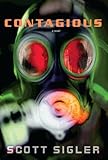 In 2007, I heard an interview with a guy named Scott Sigler on one of the many writer podcasts that I listen to. The things he was saying about publishing, about podcasting, about the way that new writers have to work extra hard to get out there and let their audiences find them, all this really struck a chord in me as a writer with a book coming out soon. Scott is one of the pioneers of fiction podcasting. He started out some years ago with a mass market publishing deal for his novel Earthcore, a deal which subsequently fell through, and the novel ended up languishing. Until, that is, he decided to put it out as a serial fiction podcast. The response he got went far beyond anyone’s expectations, and might well be the start of a paradigm shift in the publishing industry, the likes of which have never been seen before. He has since gone on to experience bidding wars between publishing houses for his subsequent works. His latest book, Contagious, came out in December, and in spite of his success in the mass market, he still podcasts his novels for free.
In 2007, I heard an interview with a guy named Scott Sigler on one of the many writer podcasts that I listen to. The things he was saying about publishing, about podcasting, about the way that new writers have to work extra hard to get out there and let their audiences find them, all this really struck a chord in me as a writer with a book coming out soon. Scott is one of the pioneers of fiction podcasting. He started out some years ago with a mass market publishing deal for his novel Earthcore, a deal which subsequently fell through, and the novel ended up languishing. Until, that is, he decided to put it out as a serial fiction podcast. The response he got went far beyond anyone’s expectations, and might well be the start of a paradigm shift in the publishing industry, the likes of which have never been seen before. He has since gone on to experience bidding wars between publishing houses for his subsequent works. His latest book, Contagious, came out in December, and in spite of his success in the mass market, he still podcasts his novels for free.
 TH: Can you give a brief arc of your career as a writer/author?
TH: Can you give a brief arc of your career as a writer/author?
SS: I’ve been telling stories most of my life. I wrote monster stories in grade school, so I’ve always wanted to entertain people that way.
TH: What is The Story of Scott? Is it a novel? A poem? An epic of interstellar horror?
SS: The Story of Scott is most akin to the Story of Napoleon – a short dude who wants to use his brain to take over the world.
 TH: Was the idea for Infected an offshoot of your subconscious desire for world domination? Do you believe marketing is the key?
TH: Was the idea for Infected an offshoot of your subconscious desire for world domination? Do you believe marketing is the key?
SS: Hmmm … INFECTED may actually be a manifestation of my desire to run, then destroy, the world. Good analysis.
Marketing is the key, yes, but not the “bad” definition of marketing.
To me, marketing is the art of finding people who would be interested in your product, and telling them that your product is available.
That’s it. No hard sell, no scams, no hype. Once a prospective customer learns about you, it’s their choice to either listen to your stories or buy your books. But, they will never buy your books if they don’t know you exist.
TH: When did you know that you wanted to be a writer? How did you know?
SS: My dad took me to see the 1976 version of King Kong. I cried through most of the movie, begged my dad to leave, but he thought it was pretty funny (and we’d paid for the tickets) so we stayed. I was still crying when I left, and as soon as I got out of the theatre I asked when we could go see it again. That was when I knew I liked being scared by movies, and I wanted to give people the same thrill by writing books.
TH: Of course, most writers want to have bestsellers or make some sort of artistic or literary impact, but you’ve been in the SF business for decades. Is there some unrealized accomplishment that you’re striving for in the near future?
SS: The one thing I’m looking for now is to bring respect to the area if biological scifi. It seems all the awards and recognition go to work that involves space opera, physics, or the ever-popular far-future dystopia (because our life here is so bad, you see, clearly we will wind up in an even worse place). I don’t see a lot of recognition for authors playing with purely biological concepts, and inparticular, authors using real science to create an unreal situation. I’m not sure why that is, or even if it’s just my perception because I don’t follow the award circuit that much. However, it would be great to see “award- winning scifi” come to mean more than just spaceships and dismal, computer-dominated dystopias.
TH: You’ve keyed on an interesting point. Biology tends to always find its place in “Frankenstein” stories and Creature Features, where the biology inevitably gets out of control and raises havoc. What other avenues might biological sciences explore?
SS: There is a lot of exploration in downloaded consciousness, cloning, and bioengineering, but most of it seems to be the hypothetical variety — few people are writing fiction to address ways in which these things could actually happen. What you mostly see is the “jump forward and assume the tech angle is covered” approach, then the “very important voices” wax philosophical about the greater implications on what it means to be human, blah-blah-blah. I take a different tact.
Whenever possible, I try to use hard biological processes to show something cool. It’s not my job to tell people what they are supposed to think, it’s the readers job to take the information and processes it any way they like. I think my readers are very solid in their self- concepts and philosophies — they don’t need a scifi writer to tell them how they should feel about something.
TH: What are some of the things that inspire you?
SS: The life sciences always give me massive inspiration. I can’t get through 15 minutes on the Discovery Channel without coming up with a new story idea.
TH: What about the writing process most appeals to you?
SS: Creating a cohesive story that doesn’t cheat at the end, doesn’t show that the writer was just plain lazy. People pay a lot of money for books — I want them to finish and say “I would have paid twice as much for that book.” It’s about hard work, putting in the wrench time to make sure everything lines up.
TH: Your meteoric success with podcasting has made you a pioneer of the podiobook, but what other ways have you used to promote yourself and your work? Are there any promising marketing avenues that you might yet explore?
SS: Mobile devices in general are the future for writing. iPhone, iPod Touches, cell phones, the Kindle — all of these things provide instant gratification for fiction fans. Understanding how consumers use these devices is my current obsession.
TH: You and the folks on Dragon Page Cover to Cover may be the only people in the publishing industry seriously looking at that question. What strategies have you come up with so far for developing that understanding?
SS: I haven’t really solved the problem yet, nor will I, since changing technology make an ever-shifting playing field. The main strategy is simple — try to provide your stories in any format available, so that your work can reach the widest possible audience. It’s not my job to tell people they should read printed books, it’s my job to provide stories in print, in audio, as PDF, cell phone, iPodTouch, print-it- yourself, etc. It’s a hard job and you can’t hit all the formats, but that’s the new environment.
TH: Since you’re at the vanguard of what could be a paradigm shift in the publishing industry, how do you foresee that it could change in the next ten years?
SS: The publishing industry as we know it is basically in its death throes. As the Baby Boomers die off, or just get too old to enjoy novels, we will lose a massive amount of people who completely identify with the paper experience. They are being replaced by people who want digital content, either text, audio or video. The Amazon Kindle really shows where things are going, and the Japanese fiction market for cell phones is another indicator that digital files are going to completely reshape the fiction marketplace.
TH: What is your vision for what form publishing industry SHOULD take?
SS: My vision is that you have a flagship product, say my novel THE ROOKIE. You make that flagship available in all possible formats, both paid (such as hardcovers) and free (such as podcasts). From there, you offer side stories, back stories, character sketches, meta-fiction, anime, machinima, all kinds of work that is not necessary for enjoying the main product. The main product stands alone, you never hold that hostage. This extra content is what you sell, for a very low price. So it follows the old razor model — you give the razor away for free, you sell the blades. If people really like THE ROOKIE’s main story, they will be happy to pay 99 cents for short fiction, $5.00 for a digital sourcebook with timelines and indexes, maybe $9.99 for a novel- length work of a secondary character, etc. You give the customer the main story, then they choose if its worth their money to read associated content.
TH: Have you reached the point at which you realized that you had “made it” as a writer and author? If so, can you describe the milestone or circumstances where you had that realization? Do you recall how that felt? If not, what is the milestone you’re seeking?
SS: I haven’t made it yet. The milestone is hitting #1 on the New York Times Bestseller list. At that point, you know you have enough sales to make back the money a publisher invests in you, and to command a good contract for the next book or books. Until then, I’m basically one book away from going back to the working world.
TH: In ten years, what else would you like to have accomplished between now and then?
SS: My goal is five #1 New York Times bestsellers. It’s a ridiculous goal, but there it is. In 10 years, I would like to have accomplished part of that goal, see at least one big-budget movie made of my work, see a ROOKIE video game, have a few graphic novels, and continue to find ways to fight for the attention of my fans.
TH: Some say that professional writers have to look at themselves as a business, a branded commodity. Do you take that approach?
SS: Absolutely. Writers who don’t think this way view themselves as a “valued artist” or some such nonsense. The bottom line is that you can make a living as a writer one of two ways — either someone subsidizes you, a-la the pledge drives on NPR, or you have enough people willing to pay for your work that allows you to make a living at it. From the latter perspective, you are a factory that produces product. Like any factory, if you make product that people won’t buy, then you’re going to go out of business. Anyone who ignores the existing science of branding and how to find the people who would happily pay for the product you produce is a total fool.
TH: What can readers expect to see from you in the near future? What are you working on?
SS: I’m working to get into TV and video game storytelling. Video games are the future of storytelling, creating a new art form where you have to write an immersive plot, something that allows for flexibility of decisions by your main character. I don’t think anyone has done this 100% right yet. Video games are very expensive, but when you do it right they can become cultural icons, like Halo. It would be awesome to see people playing in the worlds and stories I create.
TH: Sci-fi/horror games tend to make the most memorable and popular shooters (Doom, Quake, Half-Life, Crysis, Deadspace, Bioshock, etc., all of which have strong mixes of horror, action, and science fiction.) Do you envision Infected as first-person video game storyline? Are you already pitching the idea to companies like Electronic Arts?
SS: I’m trying, but it’s very difficult to get the attention of the gaming world. They seem to go for established brand names (Barker, Gaiman, etc.). So far, the video game industry is starting to sound a lot like the publishing industry — brand names first, worry about unique ideas second.
TH: What is the most memorable moment (good, bad, or other) you have had in your life as an author?
SS: My recent book tour was amazing. Eleven cities, we averaged 65 fans per stop and finished with 105 people in Washington, DC. That kind of personal, face-to-face feedback blew me away. People were just so happy to meet the guy who made some of their favorite stories, it was very exciting and humbling.
1 thought on “Author Interview Series #42 – Scott Sigler”